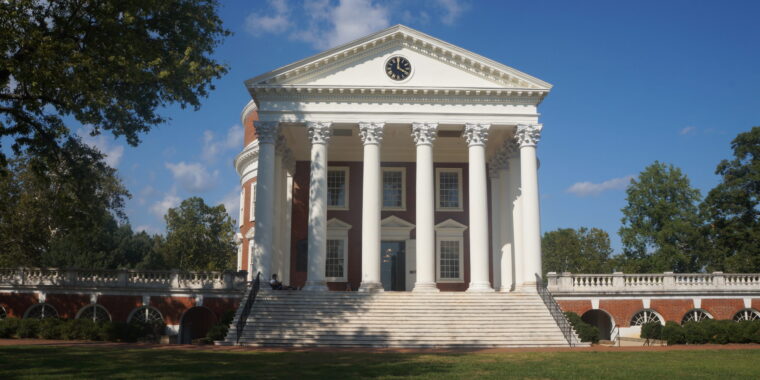
On February 21st, on behalf of the Jefferson Council and Common Sense Society, British political commentator and author Douglas Murray paid an amiable visit to Grounds—a proper tour of the Lawn and a Gus Burger from the White Spot served as our great American welcome. Murray visited UVA to discuss a pertinent issue in academic institutions across the United States, freedom of speech.
“What is a public intellectual?” Murray’s speech revolved around this question and the lack of such figures in our modern society. In his words, a public intellectual is someone who makes an assertion and is willing to defend it in public debate. His successive question asked, “What is the opposite of such a person?” Murray believes these people are the ones rampant in many institutions. He provided two examples: Robin DiAngelo, author of White Fragility, and Ibram X. Kendi, author of How to Be an Antiracist.
In their respective books, both make claims that are not bound by any research or statistics. In her book, Nice Racism, DiAngelo states that “white people are no less racist today than they were 200 years ago.” The absurdity of this statement isn’t what Murray took issue with; the problem is there is no discourse about its validity. DiAngelo has no pressure to defend her claims—to do so would be so rudimentary that it is futile. Kendi’s book goes even further with this, leading Murray to his next point about the legacy of Thomas Jefferson.
“Until the last ten years, I’ve always heard of Jefferson as a revered Founding Father of America. Now it seems everything about the man is being tarnished and forgotten.” Those were his thoughts on the increasingly infamous founder of UVA. However, this vilification of history causes two major problems which Murray expounded on.
1.) A lack of heroes to look up to causes a lack of guidance in our society
2.) Uncertainty about the past breeds uncertainty about how to move forward
Much of this stems from a fundamental lack of effort to explore viewpoints outside of what is considered “mainstream.” In reality, many of the opinions that institutions subjugate are not the majority consensus. Murray likened this to a sheepdog herding a flock of sheep who are easily swayed in one direction. The “sheep” of our society holds these opinions without much thought of their own accord; when asked to defend it, their perceived moral superiority acts as an exemption. For instance, to say “Thomas Jefferson was a generational philosopher and politician” is rendered unimportant by his ownership of slaves. “I don’t need to defend myself, he was a racist.” That statement is enough to end all discourse regarding Jefferson and other prominent turned controversial figures.
At its most fundamental level, Murray mentioned two ways to handle free speech in a pluralistic society. Either present a strict guideline on correct and incorrect speech or let all voices speak as long as there is room for so-called “public intellectuals” to debate them. In an age where many remain apolitical to save their job propositions, careers, and relationships, Murray ended by saying “if we could all take just that little step forward in resisting the subjugation from our institutions, it would result in a massive leap for maintaining the integrity of civil discourse.”


Excellent article, Landon. I attended the talk and you captured the core philosophical tenets from Douglas Murray’s talk perfectly.
I look forward to many more thought provoking articles and editorials from TJI in the future. UVA needs viewpoint diversity to the CD and your paper provides it.
Great article. This new culture, out of a sense of virtue that they themselves have defined, quenches all discourse and pervades society, especially universities. The topic of free speech is left all too often unwritten. Good job.
Landon provided an excellent synopsis of Douglas Murray’s talk. It is encouraging to see eloquent young writers bring some sanity back to editorial commentary on the Grounds of Mr. Jefferson’s University.
The Jefferson Independent is providing a rational conservative alternative to the extreme leftist drivel produced by the Editorial page of the Cavalier Daily. I look forward to seeing many more articles of this quality from Landon and others.
Thank you.